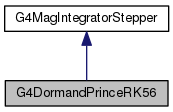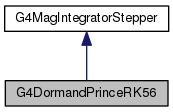618 bi[1][1] = -18487.0/2880.0 ,
619 bi[1][2] = 139189.0/7200.0 ,
620 bi[1][3] = -53923.0/1800.0 ,
621 bi[1][4] = 13811.0/600,
622 bi[1][5] = -2071.0/300,
645 bi[4][1] = -30208.0/14157.0 ,
646 bi[4][2] = 1147904.0/70785.0 ,
647 bi[4][3] = -241664.0/5445.0 ,
648 bi[4][4] = 241664.0/4719.0 ,
649 bi[4][5] = -483328.0/23595.0 ,
654 bi[5][1] = -177147.0/32912.0 ,
655 bi[5][2] = 3365793.0/82280.0 ,
656 bi[5][3] = -2302911.0/20570.0 ,
657 bi[5][4] = 531441.0/4114.0 ,
658 bi[5][5] = -531441.0/10285.0 ,
663 bi[6][1] = 536.0/141.0 ,
664 bi[6][2] = -20368.0/705.0 ,
665 bi[6][3] = 55744.0/705.0 ,
666 bi[6][4] = -4288.0/47.0 ,
667 bi[6][5] = 8576.0/235,
672 bi[7][1] = -1977326743.0/723932352.0 ,
673 bi[7][2] = 37569208117.0/1809830880.0 ,
674 bi[7][3] = -1977326743.0/34804440.0 ,
675 bi[7][4] = 1977326743.0/30163848.0 ,
676 bi[7][5] = -1977326743.0/75409620.0 ,
681 bi[8][1] = 259.0/144.0 ,
682 bi[8][2] = -4921.0/360.0 ,
683 bi[8][3] = 3367.0/90.0 ,
684 bi[8][4] = -259.0/6.0 ,
685 bi[8][5] = 259.0/15.0 ,
690 bi[9][1] = 62.0/105.0 ,
691 bi[9][2] = -2381.0/525.0 ,
692 bi[9][3] = 949.0/75.0 ,
693 bi[9][4] = -2636.0/175.0 ,
694 bi[9][5] = 1112.0/175.0 ,
699 bi[10][1] = 43.0/3.0 ,
700 bi[10][2] = -1534.0/15.0 ,
701 bi[10][3] = 3767.0/15.0 ,
702 bi[10][4] = -1264.0/5.0 ,
703 bi[10][5] = 448.0/5.0 ,
708 bi[11][1] = 63.0/5.0 ,
709 bi[11][2] = -1494.0/25.0 ,
710 bi[11][3] = 2907.0/25.0 ,
711 bi[11][4] = -2592.0/25.0 ,
712 bi[11][5] = 864.0/25.0 ,
717 bi[12][1] = -576.0/35.0 ,
718 bi[12][2] = 19584.0/175.0 ,
719 bi[12][3] = -6336.0/25.0 ,
720 bi[12][4] = 41472.0/175.0 ,
721 bi[12][5] = -13824.0/175.0 ;
725 for(
G4int i = 0; i< numberOfVariables; i++)
731 for(
int i=1; i<=12; i++){
734 for(
int j=0; j<=5; j++){
735 b[i] += bi[i][j]*tau;
743 for(
int i=0; i<numberOfVariables; i++){
744 yOut[i] = yIn[i] + Step*tau0*(b[1]*dydx[i] + b[2]*ak2[i] + b[3]*ak3[i] +
745 b[4]*ak4[i] + b[5]*ak5[i] + b[6]*ak6[i] +
746 b[7]*ak7[i] + b[8]*ak8[i] + b[9]*ak9[i] +
747 b[10]*ak10[i] + b[11]*ak11[i] + b[12]*ak12[i]);
G4int GetNumberOfVariables() const


 Protected Member Functions inherited from G4MagIntegratorStepper
Protected Member Functions inherited from G4MagIntegratorStepper














